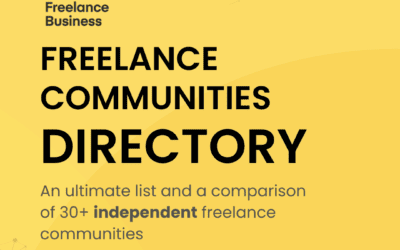Undoubtedly, one of the most challenging aspects of running a freelance business is managing clients. As a freelancer, you’ll work with lots of different personality types. You will get along better with some people than others. But when you take on a client who makes your life difficult, it can cause significant problems for you and your business. Almost every freelancer has been through hell at some point in their career by serving a client who is demanding or outright rude. The problem is, until you’ve experienced such pain (often several times), it can be tricky to spot what’s coming down the road when you land that new project. In this article, I’m going to share some simple methods for identifying difficult clients before you agree to take them on.
The 5 signs that your prospective client might be difficult to work with
Look out for these red flags to avert problems down the road.
1. The prospective client has no clear brief
Surprisingly often, we meet prospective clients who have no clear vision for their business. This can sometimes be a great opportunity as you have more freedom to take the reins and add real strategic value, but more often than not the lack of a brief is symptomatic of a deeper issue. Sometimes, the client just doesn’t have a clue. In these cases, the client is probably going to be changing their mind more often than their underwear. You’ll find it impossible to create a scope, and days-worth of work can be undone as the client switches direction once again. To avoid this scenario, be sure to interrogate the client’s overarching goals. What are they trying to achieve? What change do they wish to make in the world, and for whom? If they can’t answer, you might want to take a step back.
2. The prospect is either too relaxed or too intense
A relaxed client sounds like a good job for a freelancer, but have you ever tried getting hold of these people? It’s like trying to squeeze blood from a stone! Simply put, they’re not prioritizing your work together, and frankly, you deserve better. If a client is being tardy in their responses to your questions early on in the process, it’s a good indicator that they’re not going to be available when you work together. This means one thing: projects drag on forever. Don’t let it happen. Conversely, there are prospective clients who are super intense. They’ll scrutinize every word of your proposal and seek clarification on your pricing. They’ll send six emails at once. These clients can really sap your energy, so be wary before agreeing to move forward with them.
3. The prospect complains about other providers
Have you ever set up a call with a prospect only to be met with a barrage of complaints about their current/past providers? Let’s be honest: some freelancers do a pretty poor job and client grievances are valid, but if the prospect seems to relish being disgruntled, this is a sign that they’re not going to be the easiest to work with. The first step is to empathize with their situation and inquire a little more about it. If the conversation doesn’t move swiftly on, and the prospect can’t let it go, this is a warning sign. Take them on at your own risk!
4. The prospect won’t pay a deposit
I advise my freelance clients to always take a deposit of at least 50% of the total project fee before they do any work. This sends out a clear signal that you’re serious about your time. If a prospective client is reluctant to commit to this, allow room to negotiate to whatever feels comfortable for you, but never work without a down-payment in the bank. If they simply won’t pay up, you can almost guarantee they’re going to be trouble. Avoid.
5. The prospect is building a side business
Opportunities are abundant for freelancers because there is so much going on in the world. In our global, distributed economy, there are millions of people starting businesses right now. But not all are serious. Some people are setting up side hustles or testing ideas. If your prospect is in this camp, exercise caution. You need clients who are focused, clients who can be there to answer your questions and give feedback on your ideas. If not, you are doing yourself a disservice; you deserve clients who respect the work as much as you do. So if this is a side business, and it feels like a low priority for the client, think twice before giving it your full attention.
Sometimes, you’ve got to power through
The reason I can put this advice out there is that I’ve met each and every one of these clients multiple times. I’ve dealt with the difficulties that arise from not spotting the signs early enough. This can build character and resilience, but it’s not something you want to expose yourself to unnecessarily. The tips outlined here will give you some extra support next time you engage a prospect. Hopefully, you’ll be more empowered to make the best decisions before you sign on the dotted line. If you want to learn more about the topic, watch a replay of a session with Meadhbh Hand that she gave during our Freelance Business for Writers event. Meadhbh has given tips to help you figure out which clients are keepers and which ones to run from.




